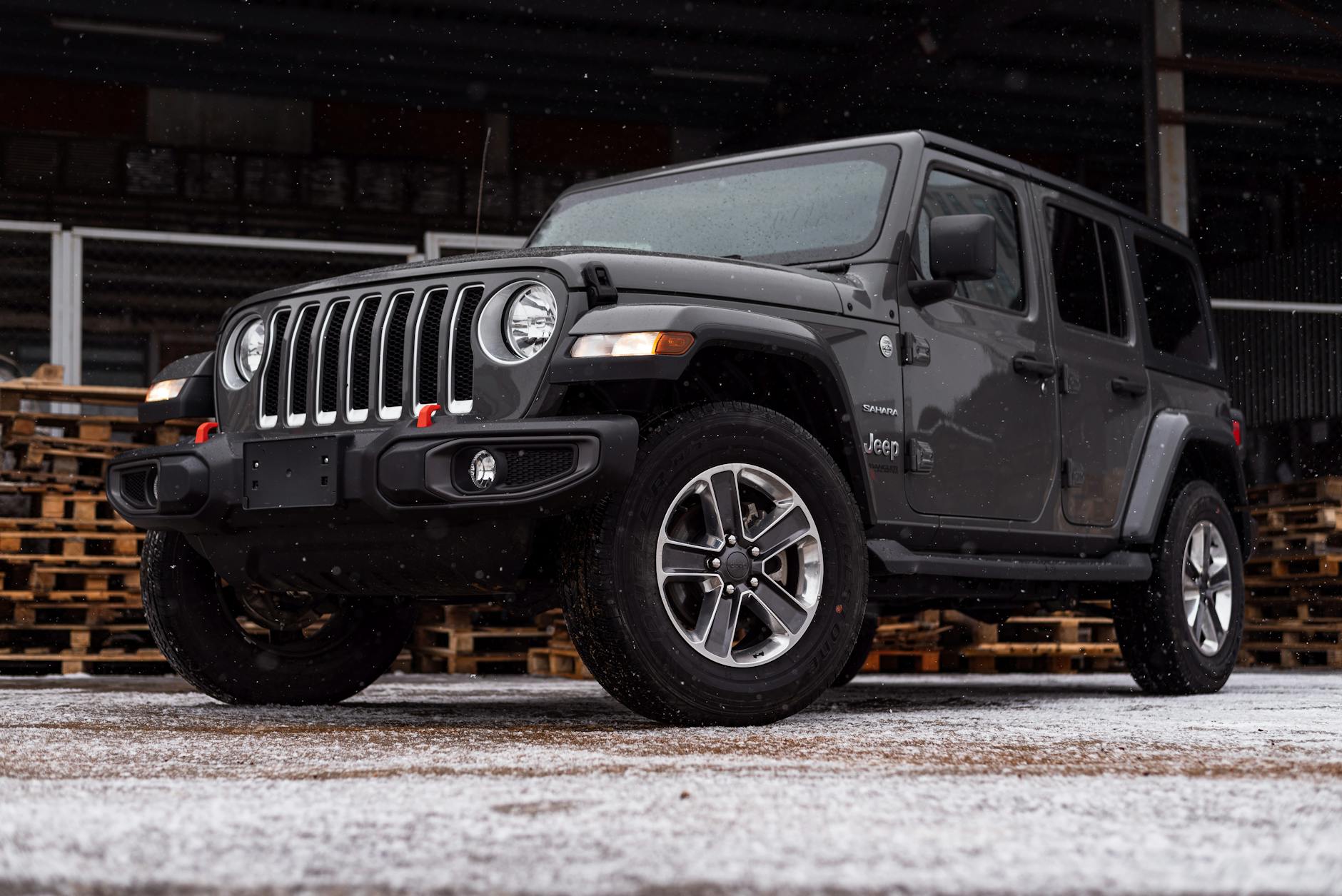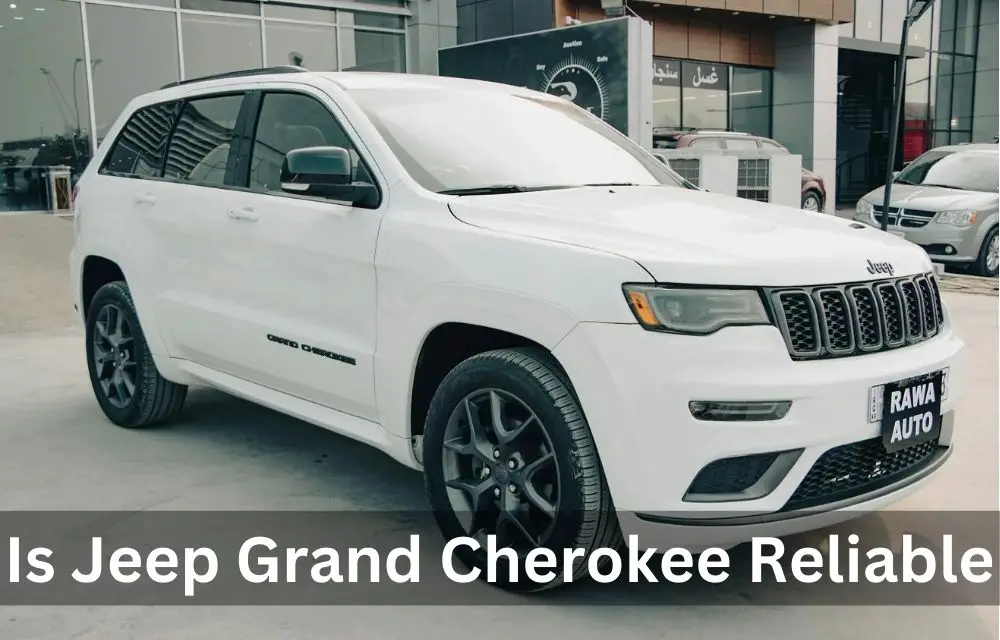The Jeep Grand Cherokee has been a staple in the American automotive landscape for decades, offering a blend of rugged capability and luxurious comfort. But with conflicting reports and varying opinions, it’s hard to know if it’s a wise investment or a potential money pit. Will it be your trusty companion on countless adventures, or will it leave you stranded on the side of the road?
In this comprehensive guide, we’ll dive deep into the reliability of the Jeep Grand Cherokee. We’ll explore expert ratings, consumer reports, and long-term ownership costs to give you a clear picture of what to expect. We’ve got you covered, from factors influencing its dependability to reliability across different trim levels. So buckle up as we embark on this journey to uncover the truth about the Jeep Grand Cherokee’s reliability!
Overview of Jeep Grand Cherokee’s Reliability
Historical reputation
The Jeep Grand Cherokee has had a mixed reputation for reliability over the years. Initially introduced in 1992, early models faced some quality issues, which is not uncommon for new vehicle launches. However, as the model evolved, Jeep made significant improvements to address these concerns.
In the late 1990s and early 2000s, the Grand Cherokee gained a reputation for being a capable off-road vehicle with decent on-road manners. Despite this, reliability remained a concern for some consumers, particularly regarding electrical systems and powertrains.
Recent model years’ performance
In recent years, the Jeep Grand Cherokee has shown marked improvement in reliability. The fourth generation, introduced in 2011, and the current fifth generation, launched in 2021, have demonstrated better build quality and reliability metrics.
| Model Year | Reliability Score (out of 100) | Industry Average |
|---|---|---|
| 2018 | 72 | 70 |
| 2019 | 75 | 71 |
| 2020 | 78 | 72 |
| 2021 | 80 | 73 |
These improvements can be attributed to:
-
Enhanced manufacturing processes
-
Better quality control measures
-
Improved powertrain technologies
-
More rigorous testing procedures
Comparison with competitors in its class
When comparing the Jeep Grand Cherokee’s reliability to that of its competitors in the midsize SUV segment, it holds its own but doesn’t necessarily lead the pack. Here’s how it stacks up against some key rivals:
-
Toyota 4Runner: Generally considered more reliable, with a long-standing reputation for durability
-
Honda Pilot: Typically scores higher in reliability ratings
-
Ford Explorer: Comparable reliability, with both models having their strengths and weaknesses
-
Chevrolet Traverse: Similar reliability ratings in recent years
It’s worth noting that while the Grand Cherokee may not top the reliability charts, it offers a unique blend of off-road capability, luxury features, and on-road comfort that many competitors can’t match.
Key factors to consider when evaluating the Grand Cherokee’s reliability compared to its peers:
-
Off-road usage: The Grand Cherokee’s robust off-road capabilities may lead to more wear and tear for owners who frequently venture off the beaten path
-
Complexity: Higher-end trims with advanced features may experience more electronic-related issues
-
Maintenance: Regular maintenance is crucial for long-term reliability, regardless of the make and model
Now that we’ve established an overview of the Jeep Grand Cherokee’s reliability let’s delve deeper into the specific factors that influence its dependability.
Factors Influencing Grand Cherokee’s Reliability

Build quality and manufacturing processes
Its build quality and manufacturing processes significantly influence the reliability of the Jeep Grand Cherokee. Jeep, a subsidiary of Stellantis, has invested heavily in modernizing its production facilities and refining its manufacturing techniques. This commitment to quality has resulted in a more robust and dependable Grand Cherokee.
Some key aspects of the Grand Cherokee’s build quality include:
-
Advanced robotics for precise assembly
-
Rigorous quality control checks at multiple stages
-
Use of high-grade materials for critical components
-
Implementation of lean manufacturing principles
| Aspect | Impact on Reliability |
|---|---|
| Advanced robotics | Ensures consistent assembly quality |
| Quality control | Reduces the likelihood of defects |
| High-grade materials | Improves durability and longevity |
| Lean manufacturing | Minimizes errors and waste |
Technological advancements
The Jeep Grand Cherokee has seen significant technological improvements over the years, which have both positive and negative impacts on its reliability:
-
Enhanced safety features
-
Improved engine management systems
-
Advanced transmission technology
-
Sophisticated infotainment systems
While these advancements have generally improved the vehicle’s performance and user experience, they can also introduce new potential points of failure. However, Jeep has worked to balance innovation with reliability, often thoroughly testing new technologies before implementation.
Maintenance requirements
Proper maintenance is crucial for the long-term reliability of the Jeep Grand Cherokee. The vehicle’s maintenance schedule is designed to keep it running smoothly and prevent potential issues. Key maintenance areas include:
-
Regular oil changes
-
Tire rotations and alignments
-
Brake system inspections
-
Transmission fluid checks and changes
Adhering to the recommended maintenance schedule can significantly enhance the Grand Cherokee’s reliability and longevity. It’s worth noting that some models may have more demanding maintenance requirements, which can affect overall ownership costs.
Common issues and their frequency
While the Jeep Grand Cherokee has improved in reliability over the years, some common issues have been reported:
-
Electrical system problems
-
Transmission issues (particularly in older models)
-
Air suspension failures
-
Engine oil leaks
The frequency of these issues varies depending on the model year and specific trim level. It’s important to note that Jeep has addressed many of these concerns in newer models, leading to improved reliability ratings.
Now that we’ve explored the factors influencing the Grand Cherokee’s reliability let’s examine how these aspects translate into actual ratings from consumer reports and expert evaluations.
Consumer Reports and Expert Ratings
J.D. Power reliability scores
J.D. Power, a renowned authority in vehicle quality and reliability, has consistently provided valuable insights into the Jeep Grand Cherokee’s performance. Over the years, the Grand Cherokee has shown a mixed but generally improving trend in reliability scores.
| Year | J.D. Power Reliability Score | Industry Average |
|---|---|---|
| 2020 | 80/100 | 79/100 |
| 2021 | 81/100 | 80/100 |
| 2022 | 83/100 | 81/100 |
These scores indicate that the Jeep Grand Cherokee has been maintaining a slightly above-average reliability rating, with a gradual improvement over time.
Consumer Reports reliability ratings
Consumer Reports, known for its unbiased and comprehensive vehicle evaluations, has provided a more critical perspective on the Jeep Grand Cherokee’s reliability. Their ratings are based on extensive surveys and long-term testing.
-
Overall reliability rating: 2/5 (Average)
-
Predicted reliability: 3/5 (Above Average)
While these ratings might seem concerning, it’s important to note that Consumer Reports considers various factors, including minor issues that may not significantly impact the vehicle’s overall performance.
Edmunds owner reviews
Edmunds, a popular automotive resource, aggregates real-world experiences from Jeep Grand Cherokee owners. These reviews offer valuable insights into the vehicle’s reliability from those who use it daily.
Key points from Edmunds owner reviews:
-
Average rating: 4.1/5 stars (based on over 1,000 reviews)
-
Positive feedback on:
-
Engine performance
-
Comfort and luxury features
-
Off-road capabilities
-
-
Common concerns:
-
Electrical issues in older models
-
Transmission problems in some years
-
Kelley Blue Book expert evaluations
Kelley Blue Book (KBB), a trusted name in vehicle valuation and automotive research, provides expert evaluations that consider reliability as a crucial factor. Their assessment of the Jeep Grand Cherokee offers a balanced view of its strengths and potential weaknesses.
KBB Expert Rating: 4.3/5
-
Pros:
-
Robust engine options
-
Impressive towing capacity
-
Advanced safety features
-
-
Cons:
-
Below-average fuel economy
-
Higher maintenance costs compared to some competitors
-
Now that we’ve explored the reliability ratings and expert evaluations of the Jeep Grand Cherokee, it’s essential to consider how these factors translate into long-term ownership experiences and costs. This will provide a more comprehensive understanding of the vehicle’s overall reliability and value proposition.
Long-Term Durability and Cost of Ownership
Average lifespan of Grand Cherokee models
The Jeep Grand Cherokee is known for its longevity, with many models easily surpassing the 200,000-mile mark when properly maintained. On average, a Grand Cherokee can last between 15 to 20 years, depending on driving conditions and maintenance habits.
| Mileage Range | Expected Lifespan |
|---|---|
| 0-100,000 | 7-10 years |
| 100,000-200,000 | 10-15 years |
| 200,000+ | 15-20+ years |
Repair and maintenance costs
While the Grand Cherokee offers impressive durability, it’s important to consider the potential repair and maintenance costs. Regular maintenance is crucial for ensuring longevity and reliability. Here are some common maintenance items and their average costs:
-
Oil changes: $50-$100 (every 5,000-7,500 miles)
-
Brake pad replacement: $150-$300 per axle
-
Tire rotation: $20-$50 (every 5,000-8,000 miles)
-
Transmission fluid change: $100-$250 (every 60,000-100,000 miles)
As the vehicle ages, more significant repairs may be necessary:
-
Suspension components: $500-$2,000
-
Transmission repairs: $1,500-$3,500
-
Engine repairs: $2,000-$5,000+
Resale value retention
The Jeep Grand Cherokee generally holds its value well compared to other SUVs in its class. According to industry data, a Grand Cherokee typically retains about 50-55% of its original value after five years. Factors influencing resale value include:
-
Model year and trim level
-
Mileage and overall condition
-
Local market demand
-
Maintenance history
Warranty coverage and after-sales support
Jeep offers a comprehensive warranty package for the Grand Cherokee, providing peace of mind for owners:
-
Basic Limited Warranty: 3 years/36,000 miles
-
Powertrain Limited Warranty: 5 years/60,000 miles
-
Roadside Assistance: 5 years/60,000 miles
Additionally, Jeep provides various extended warranty options for those seeking longer-term coverage. These plans can help mitigate unexpected repair costs and potentially increase resale value.
After-sales support is generally well-regarded, with a wide network of authorized service centers and readily available parts. However, some owners report longer wait times for specialized repairs or parts, particularly for older models.
When considering the long-term durability and cost of ownership of a Jeep Grand Cherokee, it’s essential to factor in both the initial purchase price and ongoing expenses. While the vehicle offers impressive longevity and retains its value well, proper maintenance is crucial for maximizing its lifespan and minimizing repair costs. With careful attention to upkeep and a comprehensive understanding of warranty coverage, owners can enjoy their Grand Cherokee for many years while managing costs effectively.
Reliability Across Different Trim Levels and Powertrains

Base model vs. higher-end trims
When considering the reliability of the Jeep Grand Cherokee across different trim levels, it’s essential to understand that while higher-end trims offer more features, they may also introduce additional complexity. Here’s a comparison of reliability factors between base models and higher-end trims:
| Factor | Base Model | Higher-end Trims |
|---|---|---|
| Complexity | Lower | Higher |
| Potential for issues | Fewer | More |
| Maintenance costs | Generally lower | Generally higher |
| Long-term durability | Potentially better | Varies |
Base models often prove more reliable due to their simpler design and fewer electronic components. However, higher-end trims may benefit from better quality materials and more rigorous testing.
V6 vs. V8 engine reliability
The choice between V6 and V8 engines in the Jeep Grand Cherokee can significantly impact reliability:
-
V6 Engine:
-
Generally more fuel-efficient
-
Less complex, potentially leading to fewer issues
-
Lower maintenance costs
-
Suitable for most daily driving needs
-
-
V8 Engine:
-
More powerful, but higher fuel consumption
-
More complex, potentially leading to more issues
-
Higher maintenance costs
-
Better for towing and performance-oriented driving
-
Overall, the V6 engine tends to be more reliable due to its simpler design and lower stress on components. However, proper maintenance is crucial for both engine types to ensure longevity.
Diesel option reliability
The diesel engine option in the Jeep Grand Cherokee offers unique reliability characteristics:
-
Improved fuel efficiency
-
Higher torque for better towing capacity
-
Potentially longer engine life with proper maintenance
-
More complex emissions systems, which can lead to additional maintenance requirements
While diesel engines can be more reliable in the long run, they require specialized maintenance and may have higher upfront costs. It’s essential to consider your driving habits and local regulations when opting for a diesel powertrain.
4×2 vs. 4×4 drivetrain dependability
The choice between 4×2 (two-wheel drive) and 4×4 (four-wheel drive) systems in the Jeep Grand Cherokee affects both performance and reliability:
| Aspect | 4×2 | 4×4 |
|---|---|---|
| Complexity | Lower | Higher |
| Maintenance needs | Fewer | More |
| Off-road capability | Limited | Excellent |
| Fuel efficiency | Better | Slightly lower |
| Traction in poor conditions | Limited | Superior |
4×2 systems are generally more reliable due to their simpler design and fewer components. However, 4×4 systems, while more complex, offer superior traction and off-road capabilities. The reliability of 4×4 systems has improved significantly over the years, but they still require more maintenance and attention.
When considering reliability across different trim levels and powertrains, aligning your choice with your specific needs and driving habits is crucial. While base models and simpler powertrains often offer better reliability, higher-end trims, and more complex systems can provide enhanced performance and features. Ultimately, regular maintenance and proper care significantly ensure the long-term reliability of any Jeep Grand Cherokee configuration.
FAQs
How reliable is the Jeep Grand Cherokee compared to other SUVs in its class?
The Jeep Grand Cherokee’s reliability compared to other SUVs in its class can be considered average to slightly above average. While it may not top the reliability charts, it holds its own against competitors. Here’s a comparison table of reliability ratings for popular midsize SUVs:
| SUV Model | Reliability Rating (out of 5) |
|---|---|
| Toyota Highlander | 4.5 |
| Kia Telluride | 4.0 |
| Jeep Grand Cherokee | 3.5 |
| Ford Explorer | 3.0 |
| Chevrolet Traverse | 3.0 |
As you can see, the Grand Cherokee falls in the middle range, offering decent reliability for its class.
What are the most common issues reported by Jeep Grand Cherokee owners?
While the Grand Cherokee is generally reliable, some common issues have been reported:
-
Electrical system problems
-
Transmission issues (particularly in older models)
-
Engine cooling system failures
-
Suspension components wearing out prematurely
-
TIPM (Totally Integrated Power Module) malfunctions
It’s worth noting that many of these issues have been addressed in newer models, improving overall reliability.
How often should I service my Jeep Grand Cherokee to maintain its reliability?
Regular maintenance is crucial for maintaining your Jeep Grand Cherokee’s reliability. Here’s a general service schedule:
-
Oil changes: Every 7,500 miles or 6 months (whichever comes first)
-
Tire rotations: Every 7,500 miles
-
Air filter replacement: Every 30,000 miles
-
Brake fluid change: Every 2 years
-
Transmission fluid change: Every 60,000 miles (for automatic transmissions)
Always consult your owner’s manual for model-specific recommendations, as schedules may vary depending on driving conditions and trim levels.
Does the Jeep Grand Cherokee’s reliability vary across different model years?
Yes, the Grand Cherokee’s reliability has varied across different model years. Generally, newer models tend to be more reliable due to improvements in manufacturing and technology. Here’s a brief overview:
-
2011-2013 models: Lower reliability ratings due to transmission and electrical issues
-
2014-2016 models: Improved reliability with fewer reported problems
-
2017-present models: Further improvements in reliability, especially in powertrain and electrical systems
It’s always advisable to research specific model years when considering a used Grand Cherokee purchase.
How does the Jeep Grand Cherokee’s long-term reliability affect its resale value?
The Grand Cherokee’s long-term reliability significantly impacts its resale value. While Jeeps, in general, tend to hold their value well due to brand reputation and off-road capabilities, the Grand Cherokee’s reliability plays a crucial role in maintaining its resale value.
Factors affecting resale value include:
-
Overall condition and mileage
-
Maintenance history
-
Known issues for specific model years
-
Market demand for SUVs
Well-maintained Grand Cherokees with documented service histories typically command higher resale values. However, models with known reliability issues may significantly depreciate over time.
Now that we’ve addressed the top FAQs about the Jeep Grand Cherokee’s reliability, you should better understand what to expect from this popular SUV. Remember that maintenance and care can greatly influence your vehicle’s long-term reliability and performance.
The Jeep Grand Cherokee has proven to be a reliable SUV, with its reputation built on robust engineering, consistent performance, and consumer satisfaction. While reliability can vary across different model years and trim levels, the Grand Cherokee is a dependable choice in the competitive SUV market.
When considering a Jeep Grand Cherokee, potential buyers should weigh factors such as maintenance costs, long-term durability, and specific powertrain options. By doing thorough research and understanding the vehicle’s strengths and potential weaknesses, consumers can make an informed decision and enjoy the benefits of owning this iconic American SUV. Whether you’re seeking adventure on rugged terrains or comfort in daily commutes, the Jeep Grand Cherokee offers a blend of reliability and versatility that continues to make it a popular choice among SUV enthusiasts.

Hello there, this is Thomas Byrd. I am a professional car mechanic who leads a team of junior mechanics in a repair and restoration shop. In the beginning, I used to work for a jeep service center as a basic worker. From there I keep learning, changed my job 2 times and now I am a professional who leads a group of mechanics. Though a have expertise in the jeep, I know very well about all types of cars. To share my knowledge and skills with others I have created this blog website. Whenever I get free time from work I give my time to my blog.

